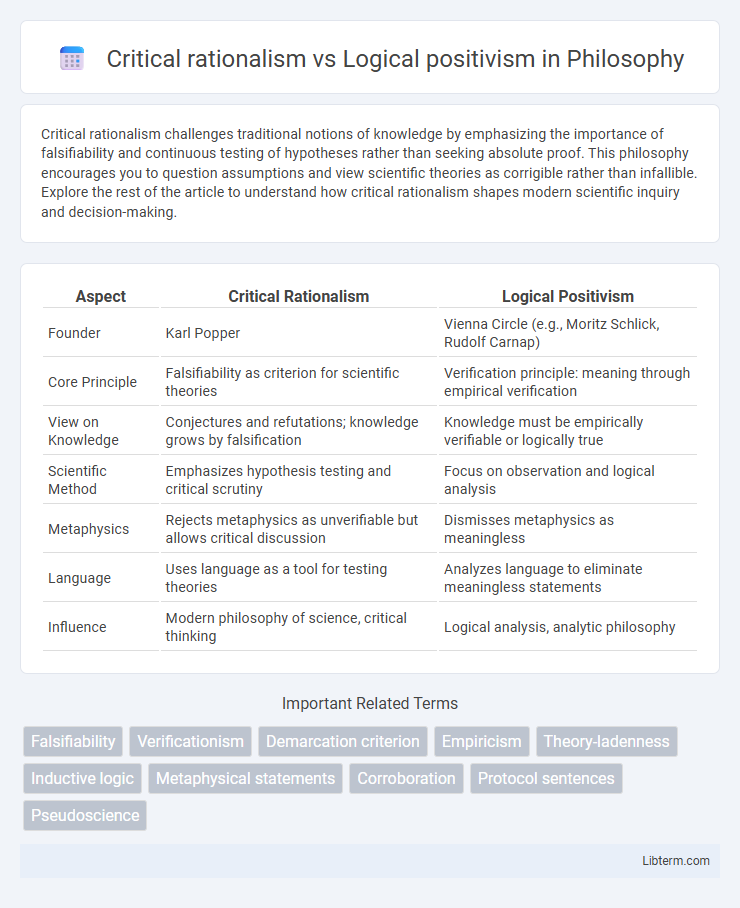Critical rationalism challenges traditional notions of knowledge by emphasizing the importance of falsifiability and continuous testing of hypotheses rather than seeking absolute proof. This philosophy encourages you to question assumptions and view scientific theories as corrigible rather than infallible. Explore the rest of the article to understand how critical rationalism shapes modern scientific inquiry and decision-making.
Table of Comparison
| Aspect | Critical Rationalism | Logical Positivism |
|---|---|---|
| Founder | Karl Popper | Vienna Circle (e.g., Moritz Schlick, Rudolf Carnap) |
| Core Principle | Falsifiability as criterion for scientific theories | Verification principle: meaning through empirical verification |
| View on Knowledge | Conjectures and refutations; knowledge grows by falsification | Knowledge must be empirically verifiable or logically true |
| Scientific Method | Emphasizes hypothesis testing and critical scrutiny | Focus on observation and logical analysis |
| Metaphysics | Rejects metaphysics as unverifiable but allows critical discussion | Dismisses metaphysics as meaningless |
| Language | Uses language as a tool for testing theories | Analyzes language to eliminate meaningless statements |
| Influence | Modern philosophy of science, critical thinking | Logical analysis, analytic philosophy |
Introduction to Critical Rationalism and Logical Positivism
Critical rationalism, founded by Karl Popper, emphasizes the fallibility of knowledge and advocates for continuous testing and falsification of hypotheses to advance scientific understanding. Logical positivism, developed by the Vienna Circle, asserts that meaningful statements are either empirically verifiable or analytically true, focusing on the logical analysis of language and verification criteria. Both philosophies aim to clarify scientific inquiry but differ in their approaches to knowledge validation and the role of empirical evidence.
Historical Background and Philosophical Origins
Critical rationalism originated with Karl Popper in the mid-20th century as a response to the limitations of inductivism and verificationism, emphasizing falsifiability as the criterion for scientific demarcation. Logical positivism, developed in the 1920s by the Vienna Circle, rooted itself in empiricism and formal logic, advocating for the verification principle to establish meaningfulness in statements. Both movements emerged from reactions to traditional metaphysics, with critical rationalism challenging the certainty claims of science and logical positivism seeking to eliminate metaphysical speculation through linguistic analysis.
Core Principles of Critical Rationalism
Critical rationalism, championed by Karl Popper, emphasizes falsifiability as the demarcation criterion for scientific theories, asserting that knowledge progresses through conjectures and refutations rather than verification. It rejects the verification principle central to logical positivism, which relies on empirical confirmation and the meaningfulness of statements based solely on sensory experience. By prioritizing critical scrutiny and the continuous testing of hypotheses, critical rationalism fosters an open-ended, fallibilistic approach to scientific inquiry, contrasting sharply with the verificationist and empiricist foundations of logical positivism.
Fundamental Tenets of Logical Positivism
Logical positivism emphasizes verificationism, asserting that meaningful statements are either empirically verifiable or analytically true, rejecting metaphysical claims as nonsensical. It prioritizes the principle of empirical observation and logical analysis to establish knowledge, advocating a strict distinction between observational language and theoretical language. This framework aims to ground scientific knowledge in observable phenomena, framing philosophy as a linguistic and logical clarification rather than speculative metaphysics.
The Role of Empiricism and Falsifiability
Critical rationalism emphasizes falsifiability as the demarcation criterion of scientific theories, asserting that empirical testing aims to refute rather than confirm hypotheses. Logical positivism prioritizes verification through direct observation and sensory experience, advocating that meaningful statements must be empirically verifiable. While both philosophies value empiricism, critical rationalism rejects absolute verification and instead focuses on the continuous testing and potential falsification of scientific claims.
Attitudes Toward Metaphysics and Science
Critical rationalism rejects metaphysics as an unverifiable and non-falsifiable domain, emphasizing science's fallible and corrigible nature for progressive knowledge growth. Logical positivism dismisses metaphysical statements as cognitively meaningless, advocating verification through empirical observation and logical analysis as essential for scientific language. Both philosophies prioritize empirical science but differ in methodological tolerance, with critical rationalism allowing conjectures beyond strict verification and logical positivism enforcing stringent verification criteria.
Methods of Knowledge Justification
Critical rationalism emphasizes the method of conjectures and refutations, advocating for knowledge justification through rigorous testing and falsification rather than verification. Logical positivism relies on verification principles, asserting that meaningful knowledge claims must be empirically verifiable or analytically true. Both approaches contrast in their criteria for scientific justification, with critical rationalism rejecting absolute certainty in favor of provisional knowledge.
Influence on the Philosophy of Science
Critical rationalism, pioneered by Karl Popper, emphasizes falsifiability as a demarcation criterion for scientific theories, significantly influencing the philosophy of science by promoting continuous testing and refutation of hypotheses. Logical positivism, developed by the Vienna Circle, asserts the verification principle, focusing on empirical verification and the rejection of metaphysics, thus shaping the analytic framework underpinning scientific language and methodology. Both movements profoundly impacted the scientific method, with critical rationalism advancing a dynamic, theory-driven approach and logical positivism reinforcing empirical evidence and logical analysis.
Major Criticisms and Limitations
Critical rationalism faces major criticisms for its reliance on falsifiability as the sole demarcation criterion for scientific knowledge, which some argue overlooks the complexity of scientific practice and theory confirmation. Logical positivism is limited by its strict verification principle, which has been criticized for being self-refuting and for dismissing metaphysical, ethical, and aesthetic statements as nonsensical. Both philosophies struggle with addressing the theory-laden nature of observation and the role of background assumptions in scientific inquiry, limiting their explanatory power in the philosophy of science.
Lasting Impact and Contemporary Relevance
Critical rationalism, championed by Karl Popper, profoundly influenced scientific methodology by emphasizing falsifiability as a demarcation criterion, which remains a cornerstone in philosophy of science and empirical research. Logical positivism, rooted in the Vienna Circle, advanced the verification principle, shaping early 20th-century analytical philosophy and logical empiricism, though its strict verificationism has largely been abandoned. Contemporary discourse continues to engage with critical rationalism's pragmatic approach to theory testing while reinterpreting logical positivism's contributions to linguistic clarity and scientific language analysis.
Critical rationalism Infographic

 libterm.com
libterm.com